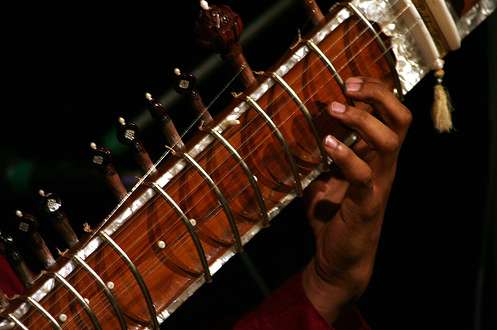FWP:
SETS
MUSIC: {10,3}
WARNINGS: {15,15}
The verse relies chiefly on the wonderful multivalence of chhe;Rnaa , as the commentators note. Its three main meanings-- 'touch', 'tease', 'play [an instrument]'-- are all here perfectly appropriate and full of resonance. (The third sense imagines no doubt not a wind instrument but a stringed instrument, such that one 'plucks' the strings.)
The lover says that a huge turmoil of complaint is barely contained within him, and the slightest touch will bring it out-- just try it and see!. As with similar expressions in English, this can be both a straightforward request ('I want to make my complaint-- please give me the occasion!') or a threat ('You don't want to hear my complaint-- don't get me started!').
The literal meaning of ;zaraa is 'a little', from which comes its idiomatic usage as a form of politeness, to soften a request by minimizing it. We use similar structures in English: 'will you just open the window a bit?' is politer than 'will you open the window?', because of both the 'just' and the 'a bit'. Conveniently, ;zaraa has both senses, and they're both excellently relevant to the line. Another example of such clever use: {193,5}.
In this verse the analogy between the lover full of complaint, and the instrument full of music, is made directly and emphatically, and has further pleasures of its own. An instrument is designed to produce music-- that's its whole goal in life, and it's judged and valued only according to the quality of the music it produces. It seems then that the lover must be similarly designed for complaint, and must have his chief excellence and self-expression in producing it. A musical instrument that remains unplayed is only latently itself, and never reaches its real potential; similarly, the lover must long for the touch/tease/plucking that will evoke his torrent of complaint. A stringed instrument vibrates in proportion to the nature, placing, and force of the plectrum with which it is played; the lover too must long to quiver when touched/teased/plucked by the beloved.
But of course there's also the pleasure of yuu;N (see the definition above, which can either reinforce the causal-seeming comparison between lover and instrument ('like this, in this way'), or else reject any causality at all ('for no particular reason, gratuitously').
Arshi suggests a comparison with {142,1},
in which the warning is against 'repeatedly digging' matters of complaint,
because 'fire' is suppressed in the heart; the risk seems to be the eruption
of a volcano. By contrast, in {233,17} the
warning is that the lover, if subjected to chhe;Rnaa
, is ready to produce a 'typhoon'. But by far the closest cousin to this
verse is {172,3}, which also warns against
the chhe;Rnaa of a musical instrument.

Ghalib:
[1860, to Shafaq:] Listen to it from the beginning: I sent your ode, after providing correction for it. An acknowledgement [rasiid] for it came, many deleted and rearranged verses came, their defects were inquired about; the defects were explained [by me]. In place of the defective words, non-defective words were written [by me]: 'there, Sahib, write these verses too in the ode'. Even now, no answer to this letter has come [from you]. I gave to Shah Asrar ul-Haq the paper directed to him. What he said orally, has been written to you [by me]. On Hazrat's [=your] part, not even this letter received an answer. A verse: {177,2}.
I reflect that both letters were sent without postage stamps-- it's impossible to believe that both were lost [because no one would steal them for the stamps]. Well, now after many days, how would a complaint be written [kyaa likhaa jaa))e]; why would stale curry [baasii ka;Rhii] come to a boil again? 'Servitude is helplessness' [bandagii be-chaaragii].
==Urdu text: Khaliq Anjum vol. 3, pp. 988-89
==another trans.: Daud Rahbar, pp. 178-79